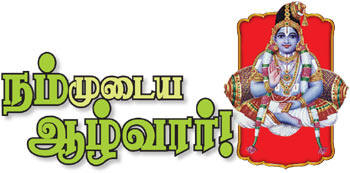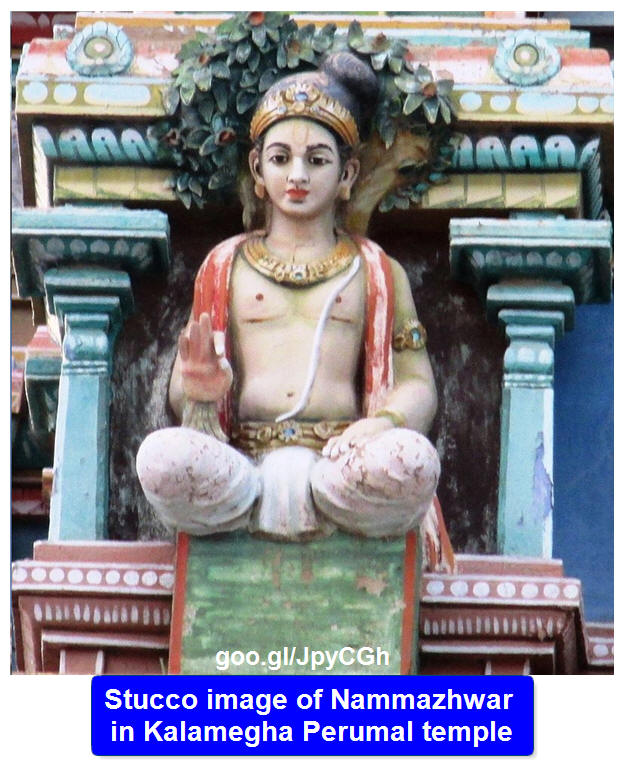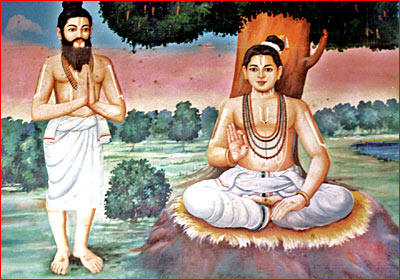T.A. Akkāragni Srīnidhi
Posted Date : 06:00 (12/06/2010)
நம்முடைய ஆழ்வார்!
Our Āzvār
Special article
|
|


There have been many great men who incarnated in this world to free us
from the miseries of the world. By their instructions, they gave us good
counsel. If not for them,
we would not have realized the greatness of the True Wisdom.
Paramātmani
Yō
rakta virakta aparamātmani
The god-loving person will entertain no love for anything else. Teaching
us this tenet, they lived what they taught us. Vaishnavism’s most
important stalwart Nammāzvār
has earned a special place.
Āzvārs
means the ones immersed in the auspicious qualities of the Inner Abider
(God). Among the
Āzvārs,
Tiruvarangam’s
Araṅgaṉ-celebrated
‘Our Own
Āzvār’
was our praise-worthy Nammāzvār.
Nammāzvār
incarnated on the auspicious day of Vaikāsi
Viśāka.
His birth, life and service to Vaiṣṇavism
were noteworthy. He was born in Tirukkurukūr.
The Vaiṣṇava world wonders whether ‘it was
Nambi
born in Tirukkurukūr.’ He was born spiritually enlightened at birth. His
parents must have been blessed to have given birth to this extraordinary
child.
நம்பி
= Nambi
=
The
elite among men, used as a term of respect
The nature of life of a human is to cry at birth and laugh episodically.
Contrarily, this child neither cried nor laughed. Since his
behavior was contrary to human nature, his parents named him Māṛan
(Contrarian).
This is the age of cruel Kaliyuga with a plethora of atheists,
antitheists… The elders
celebrated the birth of
Āzvār
endowed with a plenitude of sacred knowledge of Vedas and a will to
advance the cause of Tamil language.
When Māṛan
was growing, the grief and sadness of his parents were mounting. What is
the cause? He was not following the milestones of a normal child.
Anxiety and despondency weighed the parents down and drove them to seek
help from Tirukkūrur
SrīĀdhināthan
shrine for their son.
The parents left
Māṛaṉ
under a Tamarind tree in the temple unbeknown to anyone. Perumāl’s
commander-in-chief Srī
Viṣvaksēṉar
met with Māṛaṉ, gave him instructions on True Wisdom (sacred knowledge)
and impressed on his shoulders with burn marks of Conch and Discus.
Do you know what
Māṛaṉ did after this encounter with
Srī
Viṣvaksēṉar?
He sat under the Tamarind tree in Tapas (austerity) for 16 years with no
food and no sleep. Madurakavi Āzvār on a pilgrimage in the north saw a
beam of light coming from the south. Ecstatic at the sight, he took his
journey towards the Southern Light and arrived in the sacred city of
Māṛaṉ.
The Beam of Light guided Madurakavi to Nammāzvār and entered the
latter’s body. Nammāzvār was in deep meditation. Madurakavi threw a
small stone at Nammāzvār and woke him up. Madurakavi posed questions to
him and received apt answers. Moved by his answers, Madurakavi accepted
him as his Guru. From then on, his duteous life purpose was to render
service to Nammāzvār. (Here is an instance wherein an older person takes
an younger person as his guru.)
Thinking of the Inner Abider and melting in his bliss, Nammāzvār
composed floral verses in honey-sweet Tamil, which Madurakavi scribed on
palm leaves earning the greatness of bringing the verses to the
posterity.
As the essence of four Vedas, he gave us Tiruviruththam, Tiruvāsirium,
Tiruvāymozi, and Tiruvanthāthi, part of Divya Prabhandam. People,
despondent thinking, ‘God is difficult to attain,’ were helped to turn
their mind towards God by the benevolent Nammāzvār.
God may lead the Vedas. Perumāṉ
can go ahead of and transcend Brahma and other Devas incapable of
attaining the spiritual knowledge of Perumāṉ.
Kambar eulogizes Tiruvāymozi
saying it was the cure for the malady of metempsychosis. Further, God is
incapable of ahead of Nammāzvār’s
one verse, one foot, one line, or one word.
Vedas became weak and fatigued because explications of Vedas by multiple
pseudo-pandits reflect their wayward minds. The living Vedas did not
want to manifest as perverse interpretations but as sacred texts. If the
intent was revelation of true knowledge for the welfare of the people of
the world, their determination was to settle on the tongue of
Āzvār to reveal their true knowledge. With that intent, they abided on
the tongue of Nammāzvār. Vedānta Dēsikar praises Nammāzvār saying, “I
understood and realized the meaning of Vedas (by studying his verses).”
Maṇavāḷa Māmunikaḷ celebrates
Nammāzvār
as follows. Is there a day equal to Vaikāsi month and Visāka Star? Is
there any one equal to Satagōpaṉ?
Is South Kurukai equal or measure up to Tiruvāymozi?
He talks about the greatness of the day Nammalvar took his birth:
The auspicious day in Vaikāsi month and Visāka Nakṣatra. Is there a
place greater than Tirukkūrur, the place of his birth? Is there a
treatise greater than Tiruvāymozi? Is there anyone loftier than
Nammāzvār?
Nammāzvār lived and breathed ‘Vāsudēvas
Sarvaṁ’ (= All are Vāsudēva)
purporting, ‘The rice that we eat, the water we drink, the pan we chew
are all Kaṇṇaṉ.’
On this ‘Vaikāsi-Visāka auspicious day’ let us pay homage to Nammāzvār
and let us prosper in life.
